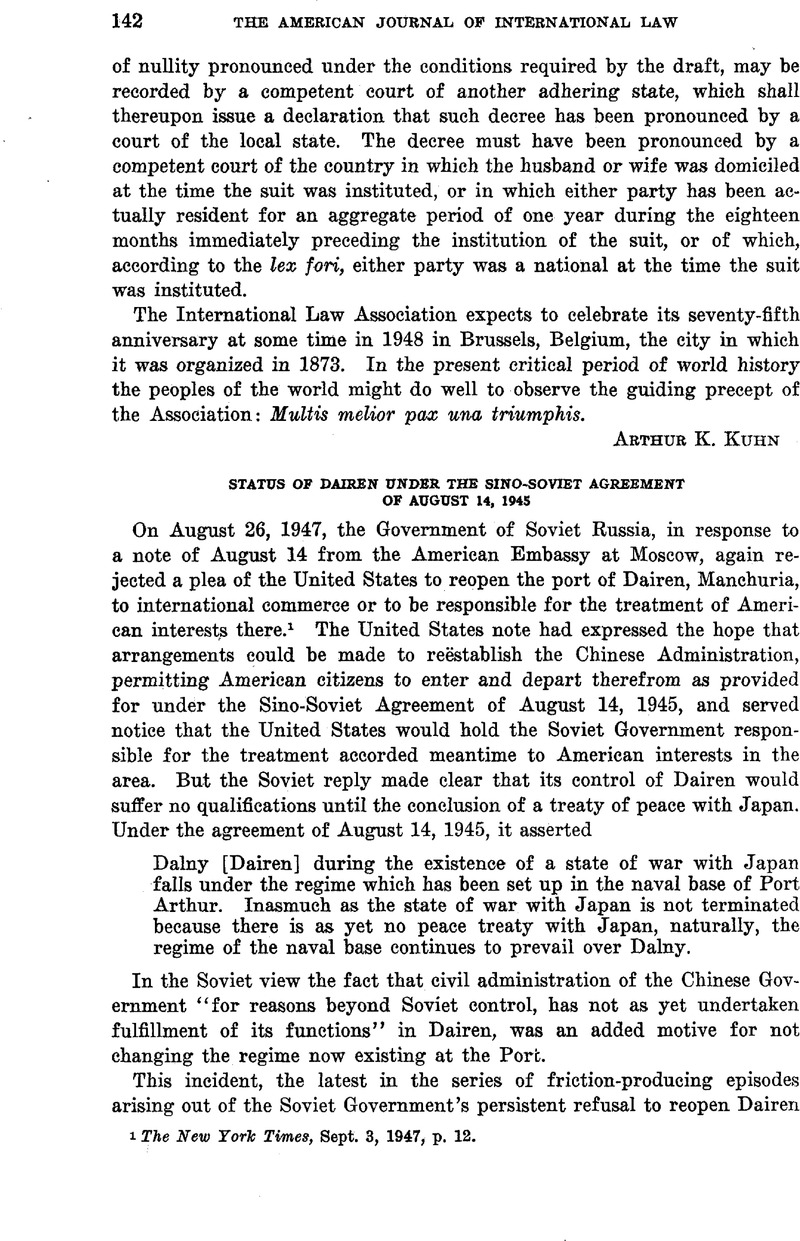No CrossRef data available.
Article contents
Status of Dairen Under the Sino-Soviet Agreement of August 14, 1945
Published online by Cambridge University Press: 20 April 2017
Abstract

- Type
- Current Notes
- Information
- Copyright
- Copyright © American Society of International Law 1948
References
1 The New York Times, Sept. 3, 1947, p. 12.
2 Simultaneously with announcement of the Chinese decision the information director at Nanking disclosed that the Government was studying reports that Russian forces are supplying Chinese Communist forces through Dairen. The New York Times, August 21, 1947.
3 Same, August 29, 1947, p. 8.
4 The Department of State has not even been free to send official courier ships into the port without prior permission, for servicing the American Consulate, as necessitated by restrictions placed upon radio communication facilities by the Soviet authorities. Same, Sept. 3, 1947, p. 12.
5 Department of State Press Release No. 8, January 6, 1947. A similar note was dispatched to the Foreign Office at Nanking, urging that negotiations be initiated directly between the Chinese and Soviet Governments along the lines indicated in the text.
6 Department of State Bulletin, Vol. XIV, No. 345 (February 10, 1946), p. 205. Full texts of the Sino–Soviet agreements referred to in the present note are reproduced in this Journal, Vol. 40 (1946), Supplement, pp. 51 ff.
7 In terms the Agreement constitutes an assumption of obligations solely by the Chinese Government; the Soviet Government does not expressly undertake to do anything. The point is mentioned at this time because inasmuch as the Chinese obligations are in the nature of a limitation upon vital rights of sovereignty (territorial dominion), there might be a possible ground for urging application of the canon of restrictive interpretation as an aid in resolving difficulties of construction due to ambiguity. The present note does not, however, invoke this approach in analyzing the legal effects of the agreement.
8 As cited. Italics supplied.
9 Paragraph 6.
10 Ahmed Emin Bey v. Great Britain, Decisions des Tribunaux Arbitraux Mixtes, Vol. 7, 1928, p. 920 at p. 922; G. Schwarzenberger, International Law, Vol. 1, p. 331; Fanchille, Traité de droit international, Vol. 2, § 1693; L. Oppenheim, International Law, Vol. II, 6th ed., rev., pp. 434, 464; and generally, Hudson in 39 Harvard Law Review (1925), pp. 1029 ff.
11 Dist. Ct., S.D. N.Y., 255 Fed. 99, 104. Accord: Industrial Commission of Ohio v. Rotar (1931), 124 Ohio St. 418; Hijo U. U.S., 194 U.S. 315, 323; Hamilton v. Kentucky Distilleries, 251 U.S. 146, 167; Ex Parte Sichofsky, 273 Fed. 694, 695–696. See Hackworth, Digest of International Law, Vol. VI, pp. 428 ff., and generally, Hudson, work cited, who points out that the precise moment at which a state of war ends within the meaning of a given statute may vary for different purposes.
A similar attitude has been taken by the Department of State. See Mr. Bayard to Mr. Muruaga, Dec. 3, 1886, Moore, Digest of International Law, Vol. VII, p. 337. President Truman–s Proclamation of December 31, 1946, expressly recognized that a state of war still existed at that time. Department of State Press Release, “Cessation of Hostilities in World War II ,” Dec. 31, 1946.
12 Hyde, International Law, 2nd ed., Vol. III , § 904; Oppenheim, work cited, p. 464.
13 Moore, work cited, p. 336, See also Phillipson, The Termination of War and Treaties of Peace, p. 5; and for examples of wars terminated in this way: Fauchille, work cited, § 1693; Phillipson, work cited, pp. 3 ff.
14 Department of State Bulletin, Vol. XIV, No. 345 (Feb. 10, 1946), p. 203.
15 There is some intimation in the Soviet note of August 26 that, even were a peace treaty to be concluded with Japan, re–opening of the port would not thereupon follow immediately, for the note refers to the Chinese Government’s failure to undertake fulfillment of its functions at Dairen.


